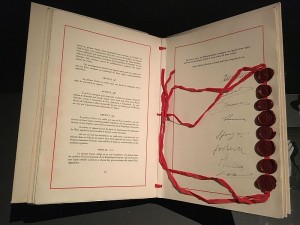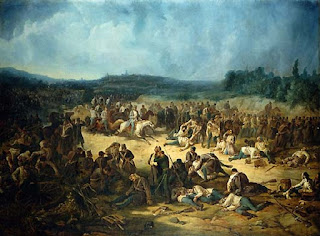With a little help from enemies - the European Union
Let’s not be cynical for a moment. Because what you’re about to read is one of the most cynicism inducing things out there. Politics, bureaucracy, diplomats in suits. No famous names, no battles, no speeches in the city center to the sound of public cheers. But let’s believe for a moment. Even if you can’t believe in the intent, at least in the result. But why do I judge without knowing you? read for yourself, because cynicism or not, it’s a fascinating story:
Europe, as we know it, is a continent of wars. The exception is not the war, like the two horrific world wars of the 20th century. The exception is the 74 years of peace so far.
1945, and Europe is torn from the newly finished World War II. Ruined cities, wounded soldiers, casualties, hurt citizens. They need to rebuild the continent - not just emotionally and financially, but also physically. Everything is so far from the Europe we know today.
Not only that, but Europe came out this war only 27 years after the end of the previous devastating war. Just like after World War I, they wanted to do everything to ensure it won’t repeat itself. At this stage they already knew, that the attempt to prevent another war after World War I had failed.
One of the reasons for this failure lies in the relationship between Germany and France. Animosity that started at least a 1,000 years prior, in conflicts over land and control of the early Middle Ages. But the peak of the conflict was about 40 before World War I, in 1871. Germany wasn’t Germany yet, but a few states on their way to national unification. Prussia, led by Chansellor Bismarck, went to war against France. Prussia defeated France, and afterwards unified into the Germany of today. As part of the victory, the Germans occupied the Alsace and Lorraine territories, and annexed them. And so, these territories became an integral part of then Germany. Obviously, the French were very, very unhappy.
They waited almost 40 years for the revenge, a German defeat in World War I. Germany surrendered to France and its allies, a few decades after humiliating France. They sat down to draft the truce treaty, France with the USA, Britain and Italy, in front of Germany - that was the infamous Versailles Treaty. The states brought different interests to the table, but they also all wanted to prevent another war. With them, sat the hurt and angry France. To prevent the war, they included a few paragraphs in the treaty. Some examples relevant to us: they forced Germany to become a democracy (a failed attempt), made them pay high compensation fees, limited its military significantly, limited its future arming ability, put presence of the allies in the German Rhine, the League of Nations, the international organization, supervised the Saarland region, other territories were given to other countries. And finally, the French got their prize - Alsace and Lorraine came back home.
So if Germany can’t develop the military, there’s supervision over regions where weapons are built, and France got its territories back, it should prevent another war, shouldn’t it? Obviously, World War II broke out, so we already know that it shouldn't.
The Europeans, beat and wounded after World War II, understood that the Versailles Treaty and the policy toward Germany after World War I failed to prevent the war.
One of the most revolutionary ideas came from a governmental administrator, not even a minister or a president, called Jean Monnet. Within a few political moves, he said something like this:
In Germany and France there is land with coal, where steel is produced. Until now, Europe tried to control the coal areas of Germany, to prevent weapon manufacture. But Europe needs the coal and steel now to rebuild itself, physically and economically. So maybe, instead of keep preventing Germany and taking territories from them, why won’t we collaborate, trade together, share our resources to rehabilitate, and also prevent another war? Sure, the French didn’t like the Germans, at all, but they also wanted to not fight anymore. And they decided to try something new - working together.
In 1950, Robert Schuman, the French Foreign Minister, gave the Schuman Declaration, where he suggested the idea - to make the next war impossible.
“The coming together of the nations of Europe requires the elimination of the age-old opposition of France and Germany”, said Schuman. “With this aim in view, the French Government proposes that action be taken immediately on one limited but decisive point”.
And how will the next war become impossible? by an economic union, which would allow all countries an equal opportunity for growth. Financial cooperation, as opposed to the separation so far, will raise everyone’s living standard. And then a long list of procedures, dull but necessary.
In 1951 the European Coal and Steel Community was established, consisting of six countries: France, Germany, Italy, the Netherlands, Belgium and Luxembourg. In 1957 the cooperation extended to other financial areas, and the European Economic Community (together with the European Atomic Energy Community) came to life. The Economic Community, which promoted the single market, quickly became the most important organization of the three. In 1967 the three communities united into the European Community. In 1973 three countries joined the community for the first time: Britain, Ireland and Denmark. Since then, the community started growing at a fast pace. In 1992, with 12 member states, the Maastricht Treaty was signed, in which the community started to be officially called “The European Union”. With it, came conditions for acceptance and membership, and broad cooperation in all aspects of life and state. Today there are 28 member states in the European Union, one of which is Britain, that’s in the process of leaving.
A perfect organization? no. An organization agreed by everybody? no. With no problems and criticism? no. But was it able to prevent war and give Europe a fresh start? for the last over 70 years, the answer is yes.



Comments
Post a Comment